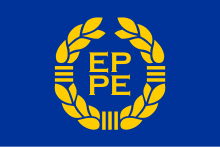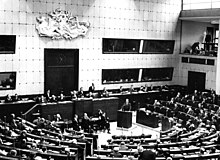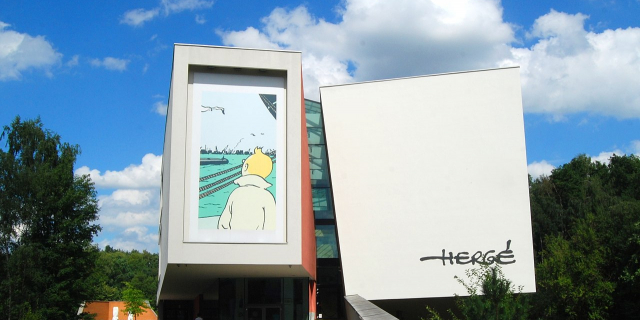The European Parliament (EP) is one of the legislative bodies of the European Union and one of its seven institutions. Together with the Council of the European Union (known as the Council and informally as the Council of Ministers), it adopts European legislation, following a proposal by the European Commission. The Parliament is composed of 705 members (MEPs). It represents the second-largest democratic electorate in the world (after the Parliament of India), with an electorate of 375 million eligible voters in 2009.
Since 1979, the Parliament has been directly elected every five years by the citizens of the European Union through universal suffrage. Voter turnout in parliamentary elections decreased each time after 1979 until 2019, when voter turnout increased by eight percentage points, and rose above 50% for the first time since 1994. The voting age is 18 in all EU member states except for Malta, Belgium, Austria and Germany, wh...Read more
The European Parliament (EP) is one of the legislative bodies of the European Union and one of its seven institutions. Together with the Council of the European Union (known as the Council and informally as the Council of Ministers), it adopts European legislation, following a proposal by the European Commission. The Parliament is composed of 705 members (MEPs). It represents the second-largest democratic electorate in the world (after the Parliament of India), with an electorate of 375 million eligible voters in 2009.
Since 1979, the Parliament has been directly elected every five years by the citizens of the European Union through universal suffrage. Voter turnout in parliamentary elections decreased each time after 1979 until 2019, when voter turnout increased by eight percentage points, and rose above 50% for the first time since 1994. The voting age is 18 in all EU member states except for Malta, Belgium, Austria and Germany, where it is 16, and Greece, where it is 17.
Although the European Parliament has legislative power, as does the Council, it does not formally possess the right of initiative as most national parliaments of the member states do, with the right of initiative being solely a prerogative of the European Commission. The Parliament is the "first institution" of the European Union (mentioned first in its treaties and having ceremonial precedence over the other EU institutions), and shares equal legislative and budgetary powers with the Council (except on a few issues where special legislative procedures apply). It likewise has equal control over the EU budget. Ultimately, the European Commission, which serves as the executive branch of the EU, is accountable to Parliament. In particular, Parliament can decide whether or not to approve the European Council's nominee for President of the Commission, and is further tasked with approving (or rejecting) the appointment of the commission as a whole. It can subsequently force the current Commission to resign by adopting a motion of censure.
The president of the European Parliament is the body's speaker and presides over the multi-party chamber. The five largest political groups are the European People's Party Group (EPP), the Progressive Alliance of Socialists and Democrats (S&D), Renew Europe (previously ALDE), the Greens/European Free Alliance (Greens/EFA) and Identity and Democracy (ID). The last EU-wide election was held in 2019.
The Parliament's headquarters are officially in Strasbourg, France, and has its administrative offices in Luxembourg City. Plenary sessions are "normally held in Strasbourg for four days a month, but sometimes there are additional sessions in Brussels", while the Parliament's committee meetings are held primarily in Brussels, Belgium. In practice, the Parliament works three weeks per month in Brussels and one (four day) week in Strasbourg.
 The European Parliament's flag until 1983
The European Parliament's flag until 1983The Parliament, like the other EU institutions, was not designed in its current form when it first met on 10 September 1952. One of the oldest common institutions, it began as the Common Assembly of the European Coal and Steel Community (ECSC). It was a consultative assembly of 78 appointed parliamentarians drawn from the national parliaments of member states, having no legislative powers.[1][2] The change since its foundation was highlighted by Professor David Farrell of the University of Manchester: "For much of its life, the European Parliament could have been justly labelled a 'multi-lingual talking shop'."[3]
Its development since its foundation shows how the European Union's structures have evolved without a clear 'master plan'. Tom Reid of The Washington Post has said of the union that "nobody would have deliberately designed a government as complex and as redundant as the EU".[4] Even the Parliament's three working locations, which have switched several times, are a result of various agreements or lack of agreements. Although most MEPs would prefer to be based just in Brussels, at John Major's 1992 Edinburgh summit, France engineered a treaty amendment to confirm the European Parliament's seat permanently in Strasbourg.[1][5]
Consultative assembly Session of the Parliamentary Assembly of the Council of Europe in the former House of Europe in Strasbourg, France in January 1967. Willy Brandt, West German minister for Foreign Affairs, is speaking.
Session of the Parliamentary Assembly of the Council of Europe in the former House of Europe in Strasbourg, France in January 1967. Willy Brandt, West German minister for Foreign Affairs, is speaking.The body was not mentioned in the original Schuman Declaration. It was assumed or hoped that difficulties with the British[clarification needed] would be resolved to allow the Parliamentary Assembly of the Council of Europe to perform legislative tasks. A separate Assembly was introduced during negotiations on the Treaty as an institution to counterbalance and monitor the executive while providing democratic legitimacy.[1] The wording of the ECSC Treaty demonstrated leaders' desire for more than a normal consultative assembly by allowing for direct election and using the term "representatives of the people". Its early importance was highlighted when the Assembly was given the task of drawing up the draft treaty to establish a European Political Community. By this document, the Ad Hoc Assembly was established on 13 September 1952[6] with extra members, but after the failure of the negotiated and proposed European Defence Community (French parliament veto), the project was dropped.[7]
Despite this, the European Economic Community and Euratom were established in 1958 by the Treaties of Rome. The Common Assembly was shared by all three communities (which had separate executives) and it renamed itself the European Parliamentary Assembly.[1] The first meeting was held on 19 March 1958 having been set up in Luxembourg City, it elected Schuman as its president and on 13 May it rearranged itself to sit according to political ideology rather than nationality.[8] This is seen as the birth of the modern European Parliament, with Parliament's 50 years celebrations being held in March 2008 rather than 2002.[9]
The three communities merged their remaining organs as the European Communities in 1967, and the body's name was changed to the current "European Parliament" in 1962.[1] In 1970 the Parliament was granted power over areas of the Communities' budget, which were expanded to the whole budget in 1975.[10] Under the Rome Treaties, the Parliament should have become elected. However, the Council was required to agree a uniform voting system beforehand, which it failed to do. The Parliament threatened to take the Council to the European Court of Justice; this led to a compromise whereby the Council would agree to elections, but the issue of voting systems would be put off until a later date.[11]
For its sessions the assembly, and later the parliament, until 1999 convened in the same premises as the Parliamentary Assembly of the Council of Europe: the House of Europe[12][13] until 1977, and the Palace of Europe until 1999.
Elected Parliament A plenary session in the Palace of Europe in April 1985, in Strasbourg, France. It was the EP's hemicycle until 1999 when a new building was constructed in Strasbourg, France.
A plenary session in the Palace of Europe in April 1985, in Strasbourg, France. It was the EP's hemicycle until 1999 when a new building was constructed in Strasbourg, France.In 1979, its members were directly elected for the first time. This sets it apart from similar institutions such as those of the Parliamentary Assembly of the Council of Europe or Pan-African Parliament which are appointed.[1][14][15] After that first election, the parliament held its first session on 17 July 1979, electing Simone Veil MEP as its president.[16] Veil was also the first female president of the Parliament since it was formed as the Common Assembly.
As an elected body, the Parliament began to draft proposals addressing the functioning of the EU. For example, in 1984, inspired by its previous work on the Political Community, it drafted the "draft Treaty establishing the European Union" (also known as the 'Spinelli Plan' after its rapporteur Altiero Spinelli MEP). Although it was not adopted, many ideas were later implemented by other treaties.[17] Furthermore, the Parliament began holding votes on proposed Commission Presidents from the 1980s, before it was given any formal right to veto.[18]
Since it became an elected body, the membership of the European Parliament has simply expanded whenever new nations have joined (the membership was also adjusted upwards in 1994 after German reunification). Following this, the Treaty of Nice imposed a cap on the number of members to be elected: 732.[1]
Like the other institutions, the Parliament's seat was not yet fixed. The provisional arrangements placed Parliament in Strasbourg, while the Commission and Council had their seats in Brussels. In 1985 the Parliament, wishing to be closer to these institutions, built a second chamber in Brussels and moved some of its work there despite protests from some states. A final agreement was eventually reached by the European Council in 1992. It stated the Parliament would retain its formal seat in Strasbourg, where twelve sessions a year would be held, but with all other parliamentary activity in Brussels. This two-seat arrangement was contested by the Parliament, but was later enshrined in the Treaty of Amsterdam. To this day the institution's locations are a source of contention.[19]
The Parliament gained more powers from successive treaties, namely through the extension of the ordinary legislative procedure (then called the codecision procedure),[20] and in 1999, the Parliament forced the resignation of the Santer Commission.[21] The Parliament had refused to approve the Community budget over allegations of fraud and mis-management in the commission. The two main parties took on a government-opposition dynamic for the first time during the crisis which ended in the Commission resigning en masse, the first of any forced resignation, in the face of an impending censure from the Parliament.[22]
Parliament pressure on the CommissionIn 2004, following the largest trans-national election in history, despite the European Council choosing a President from the largest political group (the EPP), the Parliament again exerted pressure on the commission. During the Parliament's hearings of the proposed Commissioners MEPs raised doubts about some nominees with the Civil Liberties committee rejecting Rocco Buttiglione from the post of Commissioner for Justice, Freedom and Security over his views on homosexuality. That was the first time the Parliament had ever voted against an incoming Commissioner and despite Barroso's insistence upon Buttiglione the Parliament forced Buttiglione to be withdrawn. A number of other Commissioners also had to be withdrawn or reassigned before Parliament allowed the Barroso Commission to take office.[23][24]
 Parliament's overhaul of the Bolkestein directive signalled a major growth in status for Parliament.
Parliament's overhaul of the Bolkestein directive signalled a major growth in status for Parliament.Along with the extension of the ordinary legislative procedure, the Parliament's democratic mandate has given it greater control over legislation against the other institutions. In voting on the Bolkestein directive in 2006, the Parliament voted by a large majority for over 400 amendments that changed the fundamental principle of the law. The Financial Times described it in the following terms:[25]
That is where the European parliament has suddenly come into its own. It marks another shift in power between the three central EU institutions. Last week's vote suggests that the directly elected MEPs, in spite of their multitude of ideological, national and historical allegiances, have started to coalesce as a serious and effective EU institution, just as enlargement has greatly complicated negotiations inside both the Council and Commission.
In 2007, for the first time, Justice Commissioner Franco Frattini included Parliament in talks on the second Schengen Information System even though MEPs only needed to be consulted on parts of the package. After that experiment, Frattini indicated he would like to include Parliament in all justice and criminal matters, informally pre-empting the new powers they were due to gain in 2009 as part of the Treaty of Lisbon.[26] Between 2007 and 2009, a special working group on parliamentary reform implemented a series of changes to modernise the institution such as more speaking time for rapporteurs, increased committee co-operation and other efficiency reforms.[27][28]
Recent historyThe Lisbon Treaty came into force on 1 December 2009, granting Parliament powers over the entire EU budget, making Parliament's legislative powers equal to the Council's in nearly all areas and linking the appointment of the Commission President to Parliament's own elections.[29] Barroso gained the support of the European Council for a second term and secured majority support from the Parliament in September 2009. Parliament voted 382 votes in favour and 219 votes against (117 abstentions) with support of the European People's Party, European Conservatives and Reformists and the Alliance of Liberals and Democrats for Europe.[30] The liberals gave support after Barroso gave them a number of concessions; the liberals previously joined the socialists' call for a delayed vote (the EPP had wanted to approve Barroso in July of that year).[31]
Once Barroso put forward the candidates for his next Commission, another opportunity to gain concessions arose. Bulgarian nominee Rumiana Jeleva was forced to step down by Parliament due to concerns over her experience and financial interests. She only had the support of the EPP which began to retaliate on left wing candidates before Jeleva gave in and was replaced (setting back the final vote further).[32]
Before the final vote, Parliament demanded a number of concessions as part of a future working agreement under the new Lisbon Treaty. The deal includes that Parliament's president will attend high level Commission meetings. Parliament will have a seat in the EU's Commission-led international negotiations and have a right to information on agreements. However, Parliament secured only an observer seat. Parliament also did not secure a say over the appointment of delegation heads and special representatives for foreign policy. Although they will appear before parliament after they have been appointed by the High Representative. One major internal power was that Parliament wanted a pledge from the Commission that it would put forward legislation when parliament requests. Barroso considered this an infringement on the commission's powers but did agree to respond within three months. Most requests are already responded to positively.[33]
 Moment of silence for victims of Hamas' terrorist attack on Israel, October 2023
Moment of silence for victims of Hamas' terrorist attack on Israel, October 2023During the setting up of the European External Action Service (EEAS), Parliament used its control over the EU budget to influence the shape of the EEAS. MEPs had aimed at getting greater oversight over the EEAS by linking it to the commission and having political deputies to the High Representative. MEPs did not manage to get everything they demanded. However, they got broader financial control over the new body.[34][35] In December 2017, Politico denounced the lack of racial diversity among Members of the European Parliament.[36] The subsequent news coverage contributed to create the Brussels So White movement.[37] In January 2019, Conservative MEPs supported proposals to boost opportunities for women and tackle sexual harassment in the European Parliament.[38]
In 2022, four people were arrested because of corruption. This came to be known as the Qatar corruption scandal at the European Parliament.[39]
In October 2023, the Parliament adopted a resolution to condemn "Hamas' despicable terrorist attacks against Israel".[40]

































Add new comment